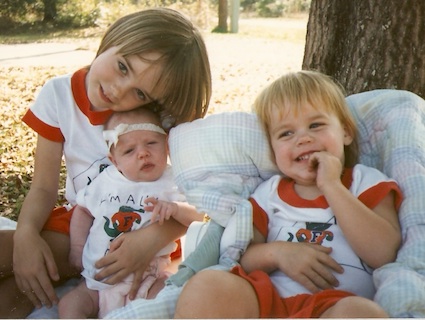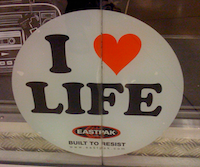Well, I’ve posted this super cute old picture of me and my two younger sisters three years in a row now to celebrate the beginning of Florida football, so let’s just consider it a tradition, shall we? GO GATORS!! –,==,<

For the Red Hot Chili Peppers, Fatherhood Is a ‘Beautiful Club’
 I love me some RHCP. During an appearance On the Record with Fuse, frontman Anthony Kiedis told host Touré what it’s like being a member of the fatherhood “club”:
I love me some RHCP. During an appearance On the Record with Fuse, frontman Anthony Kiedis told host Touré what it’s like being a member of the fatherhood “club”:
“I love the club. Good God, it’s a beautiful club. Who knew? You can’t know until you go. It’s wild.”
He also challenged the notion that having children stifles one’s freedom:
“I think people that have fear that, ‘Oh if I have a kid I won’t be able to do this and I won’t be able to do that.’ It’s kind of the opposite. It really gives you energy. It makes people better.”
Three of the band’s four members are fathers. Kiedis has a 3½-year-old son named Everly Bear, drummer Chad Smith has five children — Manon, Justin, Ava, Cole and Beckett – all under 14, and bassist Michael ‘Flea’ Balzary has two daughters – Sunny Bebop, 5½ and Clara, 22. Says Flea:
“I love being a father and wanted to be a father long before I had any business being a father. One could argue easily that I had no business being a father when I became a father at 25 … but I just love it. That kind of love — I have never experienced it before. That kind of unconditional, doing anything for a person love.”
via: People Magazine <--with video
The Rise of the Planet of the Apes and Untethered Science
Fr. Robert Barron is a master movie reviewer. Here he comments on Rise of the Planet of the Apes, embryonic stem cell research and the danger of consequentialist reasoning:
Sterilizing Addicts Doesn’t Fix the Real Problem
 Not too long ago I came across a news piece on the mission of Barbara Harris, a woman who started a group called Project Prevention which offers $300 cash to drug addicts if they agree to get on “long term” birth control. According to their most recent statistics, they have paid 3,848 addicts, with tubal ligation as the number one birth control option chosen.
Not too long ago I came across a news piece on the mission of Barbara Harris, a woman who started a group called Project Prevention which offers $300 cash to drug addicts if they agree to get on “long term” birth control. According to their most recent statistics, they have paid 3,848 addicts, with tubal ligation as the number one birth control option chosen.
I commend Harris both for her role as a former foster parent and adoptive mother of four children born to a drug addicted woman and I certainly understand her frustration. A friend of mine who worked at a crisis pregnancy center in St. Louis once told me once that the one of the hardest parts of her job was seeing women, many of whom had a history of substance abuse, come in pregnant with their 2nd, 3rd, etc.. child. These children often live in very unstable and abusive situations at home or they are taken away from their parents and put into foster care, sometimes even separated from their siblings. What’s worse, many of these women are having multiple abortions as well, or abusing alcohol and drugs while pregnant that their babies end up being born with Fetal Alcohol Syndrome or other drug-related conditions.
It’s maddening to say the least. Harris is right to be angry at the damage that these drugs do to children and she has loads of public support, but is paying addicts to get sterilized the answer?
I’d say it’s a bit misguided, at best. Chiefly because, as awful as their situations are, the children are not the problem. Substance abuse is the problem. Sexual immorality, and in many cases sexual abuse, is the problem. Eliminating the possibility of children being born is not an answer to either of these problems, nor is it a “positive step” for all addicts/alcoholics” as Project Prevention (PP) asserts on it’s website.
PP says that one of the benefits of sterilization for the addict is that it would prevent them from “the guilt and pain they feel each time they give birth only to have their child taken away.” But why is that a good thing? That only leaves them with less incentive to ever get clean. Certainly some addicts do choose drugs over their children, but for many others the feeling of responsibility for another person is powerful motivation to seek help for their addiction and the other problems in their lives. My friend saw this happen a number of times in her pregnancy resource center. That’s not to say that addicts should be encouraged to have children in the hopes that it’ll help turn their lives around. Nevertheless, new life is new hope, not a problem to be eliminated.
Not every addict is going to get pregnant or get someone else pregnant and just because someone is on drugs today, doesn’t mean he still will be tomorrow or several months/years down the road. Bribing them to undergo an unnecessary medical procedure to render themselves permanently sterile: a. sends the message that there is no hope for them to ever be rehabilitated and b. denies them the opportunity to start a legitimate family when and if they do finally get clean.
While I’m grateful that they’re not advocating forced sterilization this approach still has a eugenic feel to it and exploits vulnerable people. People who are at probably the lowest point in their lives and struggling financially. Drug addicts have been known to do anything for money, whether it’s to buy more drugs or to just pay their rent and buy some groceries. No doubt $300 in cash looks awfully good to someone broke or in debt from their addiction, even if it means they have to undergo unnecessary surgery to get it.
The welfare of children should be our highest priority, but using cash incentives to often poor and vulnerable men and women raises serious ethical questions.
Addiction is an epidemic in America and it is one disease we can not afford to underestimate. To their credit, PP does acknowledge that ideally every addict should have the opportunity to seek and find treatment. But such treatments, they point out, are not widely available and from my understanding the ones that do exist often come with a very hefty price tag that most insurance companies will not cover.
The bigger problem, I think, is that, because of the social stigma of drug abuse, support for drug addicts and their families is just lacking in society in general (a matter not helped by urging them to get sterilized). As one mother testifies, “when I had breast cancer I opened up the door and there were twenty women out there to help me. Everybody wanted to help me. But when my son was an addict I opened the door and there wasn’t anybody. So, you’re alone and you isolate yourself.” It seems to me there is less sympathy towards drug addicts because, unlike something like breast cancer, which the person does not ask for, substance abuse often begins as a personal choice. The problem is that eventually the disease of addiction takes over and the addict is no longer acting on his own free will.
 By and large people with addiction don’t need “clinic” as much as they need “community” and, as it’s name suggests, that’s just what the Comunità Cenacolo is. It’s community. It’s family. It’s love. It’s hope. Not only are they dedicated to reaching out to drug addicts and their families, but their services are free and, through prayer, hard work and personal outreach, they provide for the underlying reasons many of these people turn to drugs in the first place – loneliness, low self-esteem/sense of self worth selfishness and, of course, lack of faith. It is a “school of life”, providing for the complete person, not just helping them get “off drugs” but giving them the tools to deal with their defects when they re-enter the world and all its temptations. This is the kind of healing that needs to take place in order to truly build up a culture of life!
By and large people with addiction don’t need “clinic” as much as they need “community” and, as it’s name suggests, that’s just what the Comunità Cenacolo is. It’s community. It’s family. It’s love. It’s hope. Not only are they dedicated to reaching out to drug addicts and their families, but their services are free and, through prayer, hard work and personal outreach, they provide for the underlying reasons many of these people turn to drugs in the first place – loneliness, low self-esteem/sense of self worth selfishness and, of course, lack of faith. It is a “school of life”, providing for the complete person, not just helping them get “off drugs” but giving them the tools to deal with their defects when they re-enter the world and all its temptations. This is the kind of healing that needs to take place in order to truly build up a culture of life!
For more information visit:
http://www.comunitacenacolo.it
http://www.comunitacenacolo.org
Previous:
A Path to Freedom and Peace for Addicts
TOB Tuesday: Healing the Person
TOB Tues: Objectification Goes Both Ways
Last week I noted that to truly love is to revel in the other’s very existence. That is, to love that person for who he or she is, not how they make you feel or what you can gain from them. The opposite of that love is use, which I’ve also talked a lot about here in the past (here, here and here), mostly in terms of pornography and using the other’s body for one’s own physical gratification. Because of pornography, we tend to think of the objectification of human beings, especially sexually, as a problem of the male gender. But, women are just as capable of using men as men are of using women and often in the same ways. In fact, more and more women are using pornography.
For the most part, however, the ways women objectify men are more emotional and subtle, though still contrary to real love. Simcha Fisher outlines some of these ways in her recent post for The National Catholic Register:
I want to emphasize that even loving people can be selfish from time to time, without committing a mortal sin or wrecking their marriage. I have, however, seen a woman whose radical objectification of her husband brought their marriage to an end. There was no other way to describe it: she treated him like a thing until he couldn’t stand it any more.
This is how women, without even realizing it, often objectify men.
Deep Thoughts By Kevin Arnold
This is one of my favorite television scenes. The Wonder Years had some excellent writing:
All our young lives we search for someone to love. Someone who makes us complete. We choose partners and change partners. We dance to a song of heartbreak and hope. All the while wondering if somewhere, somehow, there’s someone perfect who might be searching for us. -Kevin Arnold
Yes! Someone perfect is searching for us! He has been pursuing our hearts since the day we are born. He is our Maker, our Savior and our King, but ultimately, He wants to be our Lover. Open your heart to Him!
The Task of Life
Earlier this month, the UK Daily Mail ran what is truly one of the most disturbing things I’ve ever read. It’s one woman’s first-hand account of how she helped her mother dehydrate to death. At the age of 88, paralysed, incontinent and unable to speak following a series of small strokes, her mother had had enough.
She wasn’t dying. She was “humiliated by her helplessness” and wanted to die. So her daughter and the staff at the nursing home she was living in kept her “comfortable” while she starved and dehydrated for 13 days before finally dying.
The whole article is a prime example of what I mean when I say that the Culture of Death is rooted in an inability to meaningfully connect with suffering. More on that here.
I love this excerpt from a letter to his brother that Russian author Fedor Dostoevsky wrote when he was sentenced to 4 years of exile and hard labor in Siberia, where he suffered terribly:

“Brother, I’m not depressed and haven’t lost spirit. Life everywhere is life, life is in ourselves and not in the external. There will be people near me, and to be a human being among human beings, and remain one forever, no matter what misfortunes befall, not to become depressed, and not to falter – this is what life is, herein lies its task.”
Life is a gift, our task is to receive it, cherish it and live it – in good times and in bad, even through sickness and old age. Yes, that means you might have to suffer a little or a lot, but life is still life.
Even in the midst of extreme suffering, even as our bodies deteriorate and we lose control of some of our basic bodily functions, we are still human beings. Our lives still have meaning.
What’s more, if we let Him, God uses those times of trial to strengthen us with His strength, to educate us in the practical living-out of those valuable virtues: humility, patience, courage, and perseverance.
There is beauty in human weakness. We’re just often too proud to see it.
Better Off Dead?
Today Judie Brown re-published on her blog a post I wrote a few years ago here on mine. It’s was a response to two articles debating whether a set of conjoined twins “deserved to be born” (not really “euthanasia” as I originally said in the post, der. Should have said eugenics). Since the subject matter is still relavent today (both in terms of how we view life with a disability and what many “futile care” advocates are really after) and because I’ve gotten quite a few new readers since that post was written, I do hope you’ll check it out: here or at American Life League.
“God Took the Burden of that Suffering Off of Us”
“(God) used that physical and mental and spiritual depletion to bring us to an end of ourselves and a place where we would have to depend on His strength instead of our own” -Greg Lucas:
Wrestling With An Angel from Brian Patton on Vimeo.
Yes, life is hard when you have a child with disabilities, but it is also very rewarding and a lesson in total abandonment.
See also:
The Beauty of Human Weakness
Your Handicapped Child is a Blessing
TOB Tues: To Love is to Revel in Each Other’s Very Existence
 I just love this:
I just love this:
Adam revels in the goodness of Eve’s very existence, just as she revels in the goodness of his; it is as if they said to each other: “It is good that you exist and that we exist together.” It’s only when lovers recognize this depth dimension in each other that their love becomes hardy enough to outlast changes in their feelings or alterations in their qualities and attributes.
From Called to Love: Approaching John Paul II’s Theology of the Body
Related: To Love is to Create Anew